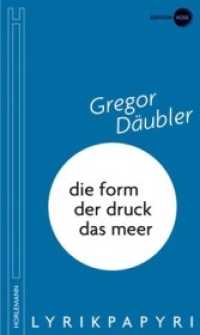- ホーム
- > 洋書
- > 英文書
- > Computer / General
Full Description
The six-volume proceedings set LNAI 15919, 15920, 15921, 15922, 15923 and 15924 constitutes the refereed proceedings of the 18th International Conference on Knowledge Science, Engineering and Management, KSEM 2025, held in Macao, China during August 4-7, 2025.
The 106 papers and 66 short papers are included in these proceedings were carefully reviewed and selected from 354 submissions. They focus on all aspects of the exchange of research in artificial intelligence, data science, knowledge engineering, AI safety, large language models, and related frontier areas.
Contents
.- ACL:Adaptive Chunking of Large Language Models for Efficient Inference on Automotive Edge Devices.
.- The Evaluation of Parameter-agnostic Unlearning Mechanisms on Prevailing Large Language Models.
.- Node Centrality Approximation in Complex Networks via Inductive Graph Neural Networks.
.- Carbon Market Price Prediction Method Based on Multi-feature Fusion and Deep Learning.
.- MMtuning: An Advanced Multi-Adapter Framework for Efficient Multimodal Large Language Models Fine-Tuning.
.- Multi-Sensor Fusion Framework for HAR: Integrating Time-Frequency Features and Self-Supervised Learning.
.- Deep Reinforcement Learning-Based Client Selection and Secure Aggregation for Federated Learning.
.- DynamicFedPEFT: Efficient fine-tuning of dynamic federated parameters for large language models.
.- Dynamic, Multi-Scale, and Noise-Aware Modeling for Skeleton Action Prediction.
.- Adaptive Retrieval Enhancement for Open-Domain Question Answering.
.- Privacy-Preserving Exact Closest Vertex Queries on Encrypted Attributed Knowledge Graphs.
.- Text Attributed Graph Node Classification Using Sheaf Neural Networks and Large Language Models.
.- TIEBN: An Eigenvalue-Driven Blockchain Network for Anomaly Detection.
.- Enhanced Knowledge Tracing via Imputing Knowledge States.
.- Resisting Catastrophic Recall: Persistent Unlearning via Knowledge Distillation with Feature Suppression.
.- Enhancing Legal Judgment Prediction in LLMs via Legal Norms Integration.
.- Geo-DETR: Geographical Map Detection Based on Multi-Stage Gradient Feature Fusion.
.- FATFI: A Framework to Generate Adversarial Traffic with Feature Interpretability.
.- Enhancing Multi-Source Localization via Tailored Feature Representation Framework.
.- FedMP: A Multi-Prototype Heterogeneous Federated Learning Framework.
.- CGM: Intrusion Detection Based on a Multi-Head Attention Optimization Model.
.- FusionMIA: Enhancing Membership Inference Attacks with Spy Clients and Shadow Models in Federated Learning.
.- DynaKiteQuery: Top-k Closest-Vertex Queries on Dynamic Attributed Knowledge Graphs.
.- Evaluating LLMs for Multi-label Text Classification.
.- Generating Feedback for School Students Essay with Large Language Models.
.- Dynamic Asymmetric Contrastive Learning with Adaptive Hard Negative Mining for Resume-Job Matching.
.- TRIAD: A Tool-Responsive Instruction-Aligned framework for domain-specific problem solving.
.- Verifiable fine-grained federated unlearning.
.- MCC: Multi-level Feature and Context-aware Attention Mechanism with Consistent Distributions for Recipe Retrieval.
.- Heuristic Ant Colony enabled Federataed UAV Circuit Inspection Planning Algorithm Considering Adaptive Weather.
.- Context-aware Spatiotemporal Graph Attention Network for Next POI Recommendation.
.- From Thinking to Output: Chain-of-Thought and Text Generation Characteristics in Reasoning Language Models.







